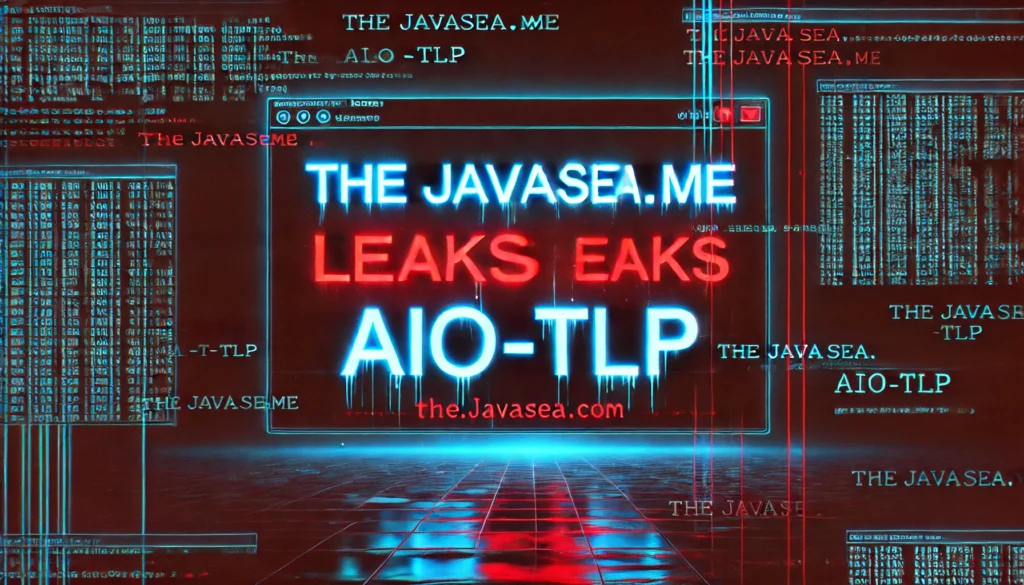How Leaks from the Java Sea Me (thejavasea.me) Are Gaining Attention
In recent months, a sequence of alarming safety breaches has captured the attention of the cybersecurity community and tech fanatics alike. The leaks originate from thejavasea.me, such as the AIO-TLP287 leak, which has raised extreme concerns about statistics, privacy, and online security. With the boom in information breaches throughout numerous structures, information about the significance of these leaks is important to safeguarding your private statistics.
Table of Contents
What is thejavasea.me?
Thejavasea.me is a website that has recently become a focal point in discussions about cybersecurity risks. Known for offering online services, the platform’s security breach and data leak incidents have put it under scrutiny. Despite its purpose to provide users with a range of services, thejavasea.me has been compromised multiple times, leading to unauthorized access to sensitive data.
What Does AIO-TLP Mean?
Before diving deeper into the AIO-TLP leaks, it’s essential to understand the term AIO-TLP. AIO-TLP stands for All-in-One Traffic Light Protocol, a security classification used in cyber threat intelligence. It helps to categorize the severity and confidentiality of the leaked information, with the TLP designating the sensitivity level. When applied to the thejavasea.me leaks, AIO-TLP indicates that the leak involved highly sensitive user data, possibly leading to identity theft risks or worse.
Understanding the AIO-TLP287 Leak on thejavasea.me
The AIO-TLP287 leak refers to one of the most significant data leaks associated with thejavasea.me. This incident exposed vast amounts of personal data and login credentials. Hackers exploited vulnerabilities in the Thejavasea website, gaining access to sensitive user data. This leak has been widely discussed on tech forums and social media, with many users voicing their concerns about the potential consequences.
Why is the AIO-TLP287 Leak Significant?
The AIO-TLP287 leak is great because of the character of the leaked information. It wasn’t just usernames and passwords uncovered; however, additionally financial information, email addresses, or even personal identity data. This degree of publicity ought to result in identity theft or maybe monetary fraud. The incident highlights the vulnerabilities in website security and the want for organizations to implement robust cybersecurity measures to shield their customers.
What Information Has Been Exposed in the Leak?
Some of the most sensitive data revealed in the thejavasea leaks include:
- Personal Identification Details: Full names, addresses, and social security numbers.
- Login Credentials: Usernames and passwords, including those for email and banking accounts.
- Financial Information: Credit card numbers and transaction histories.
- Email Communication: Personal and professional emails containing confidential discussions.
This type of data breach is specifically regarding it, as it will increase the probability of financial fraud and phishing attacks, making affected people more prone to ransomware risks and other cyber threats.
Who Might Be Affected by the AIO-TLP287 Leak?
The AIO-TLP287 breach affects a wide range of users, from everyday internet surfers to individuals with high-profile roles. Anyone who has interacted with thejavasea.me could potentially have their information exposed. Leaked credentials mean that even users who weren’t directly involved with the breach might find their accounts compromised through phishing attacks or malware threats.
How Did the AIO-TLP287 Leak Occur?
The AIO-TLP287 leak turned into the result of a cyber attack that exploited vulnerabilities in internet safety. The hackers had been capable of passing the internet site’s security features and having access to the backend machine. Common methods of assault include SQL injections, move-website scripting (XSS), and exploiting susceptible encryption protocols. Penetration testing and internet protection audits could have probably prevented this breach.
How Does thejavasea.me Impact Data Privacy?
With its repeated safety breaches, thejavasea.me has turned out to be a cautionary story about the significance of online protection. The platform’s failure to secure touchy statistics demonstrates how quickly personal data publicity can occur, mainly while websites are at risk of hacking incidents. This breach has forged doubt at the internet site privacy guidelines of many online offerings and prompted customers to think again about their very own cybersecurity attention.
Can Users Protect Themselves from Such Breaches?
At the same time as websites need to take primary duty for securing consumer information, individuals also can take steps to defend themselves from capability threats:
- Use Strong, Unique Passwords: Avoid the use of the same password throughout multiple structures to lessen the effect of compromised bills.
- Enable Two-Factor Authentication: Adding an extra layer of safety to your online debts can make it harder for hackers to benefit from unauthorized access.
- Encrypt Your Data: Use encryption equipment to protect sensitive files from being exposed at some point due to data leaks.
- Stay Vigilant for Phishing Attacks: Be cautious of unsolicited emails or messages that ask for private records, especially after a statistics breach.
What to Do When Personal Data Leaks
If you believe your personal information has been exposed in a leak, here are some immediate actions to take:
- Change Your Passwords: Ensure that any account linked to thejavasea.me is updated with a strong, unique password.
- Monitor Your Accounts: Check your bank and credit accounts for any unauthorized transactions or activities.
- Report the Leak: Inform the relevant authorities or the website in question to investigate and mitigate the damage.
- Consider a credit freeze: This can help prevent identity theft or financial fraud stemming from exposed financial information.
How to Protect Online Personal Data
Shielding your online personal records is important in these days’s virtual world. Recollect those first-rate cybersecurity practices:
- Install Antivirus Software: Make sure that your devices are protected from malware threats and different online dangers.
- Secure Your Wi-Fi: Make sure your home network is covered with a robust password and keep in mind using a VPN for online security.
- Update Software Regularly: Maintain all your devices and software up to date to shield against security vulnerabilities.
Are There Legal Repercussions for the Leak?
In many jurisdictions, information breaches deliver severe felony results. Website proprietors are legally obligated to protect consumer information under various online facts regulations. Cybersecurity laws, including the General Data Protection Regulation (GDPR) in Europe and the California Consumer Privacy Act (CCPA), impose penalties on groups that fail to protect private statistics. Within the case of thejavasea.me, affected users may additionally have felony grounds to seek reimbursement for privacy violations or damages springing up from the breach.
What Are the Long-Term Implications of the Leak?
The AIO-TLP287 leak is not just a short-term issue—it has long-term implications for both the website and its users. Thejavasea.me will likely face public backlash, damage to its reputation, and potentially legal consequences. For users, the leak could lead to ongoing identity theft risk, and their personal data exposure could result in financial fraud or account breaches years after the incident.
Conclusion
The thejavasea.me leaks, particularly the AIO-TLP287 leak, serve as a stark reminder of the cybersecurity dangers that pervade the virtual globe. With the publicity of sensitive facts, identity robbery and monetary fraud end up as actual threats to affected people. To shield in opposition from future data breaches, it is vital to undertake great cybersecurity practices, screen bills for suspicious activity, and stay knowledgeable about emerging threats. Remember, statistics privacy is a shared duty, and securing your online presence starts with each character’s vigilance and sturdy security measures by service vendors.
FAQs
What is the thejavasea.me AIO-TLP leak?
It’s a data breach that exposed sensitive user information on thejavasea.me through a security vulnerability.
How did the data breach happen?
The breach occurred due to weaknesses in thejavasea.me’s security, allowing hackers unauthorized access to user data.
What data was exposed in the breach?
The leak exposed usernames, passwords, emails, and financial information.
Who was affected by the leak?
Anyone who used thejavasea.me could be impacted, as their personal data was compromised.
How can I protect my data?
Use strong passwords, enable two-factor authentication, and be cautious of phishing attacks.
Are there legal consequences for the breach?
Yes, thejavasea.me may face legal actions under cybersecurity laws, and affected users could seek compensation.







